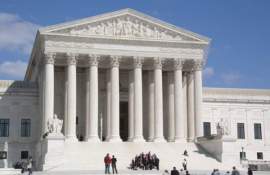
Epperson v. Arkansas

The Background of Epperson v. Arkansas (1968)
Teacher Susan Epperson was hired to teach Science to High School Students; in accordance to Arkansas legislature with regard to the instruction of evolution, she abstained from including the theory of evolution within her studies. However, upon the receipt of an updated textbook, she had noticed that the curriculum as expressed within the textbooks included the theory of evolution; as a result, Epperson found herself in what she had perceived as an unconstitutional circumstance in which she would be forced to choose between defying Arkansas legislature or removal from her position due to her refusal to adhere to the expressed curriculum.
A statute passed by the State government of Arkansas in 1928 stated that the instruction of evolution within the public school system in the State of Arkansas was to be prohibited
The Establishment Clause within the 1st Amendment of the Constitution of the United States requires that outlaws the establishment of any supplemental legislation or statutory law that joins the interests of religious bodies with interests of the general population
Also known as the ‘Separation of Church and State’ – the government is prohibited from placing the interest of any institution or agency over those of the general populace of citizens
The Case Profile of Epperson v. Arkansas
The following is a case profile of the legal trial eponymously titled ‘Epperson v. Arkansas’:
Date of the Trial: October 16th, 1968
Legal Classification: Administrative Law; this legal field associated with events and circumstances in which the Federal Government of the United States engages its citizens, including the administration of government programs, the creation of agencies, and the establishment of a legal, regulatory federal standard
The Nature of the Appeal: The following criminal activity and charges were cited by Susan Epperson against the State of Arkansas within the appeal brought forth subsequent to the initial ruling:
Epperson explained that with regard to her 1st Amendment Rights, the inability to include the theory of evolution within her lesson plan was not only a violation of the freedom of expression, but also a violation of the separation of the church from the State
Furthermore, Epperson explained that a choice between conducting illegal activity or losing her position was a violation of her 14th Amendment Rights, infringing on her individual ‘pursuit of happiness’
United States Reports Case Number: 393 U.S. 97
Date of the Delivery of the Verdict: November 12th, 1968
Legal Venue of Epperson v. Arkansas: The Supreme Court of the United States
Judicial Officer Responsible for Ruling: Chief Justice Earl Warren
Involved Parties: The following are the parties named with regard to their involvement in the Epperson v. Arkansas case:
Susan Epperson; Plaintiff –
The State of Arkansas; Defendant -
Verdict Delivered: The Supreme Court overturned the Arkansas State legislature forbidding the instruction of evolution, claiming that the statute violated the prohibition of any enforcement of religious viewpoints considered to infringe on the freedom of speech and the right to free expression
Associated Legislation with regard to Epperson v. Arkansas: The following statutory regulations were employed with regard to the Epperson v. Arkansas trial:
The 1st Amendment states that he passing or creation of any law which establishes a religious body and directly impedes the autonomy and agency of an individual with regard to religious belief
NEXT: Escobedo v. Illinois





















